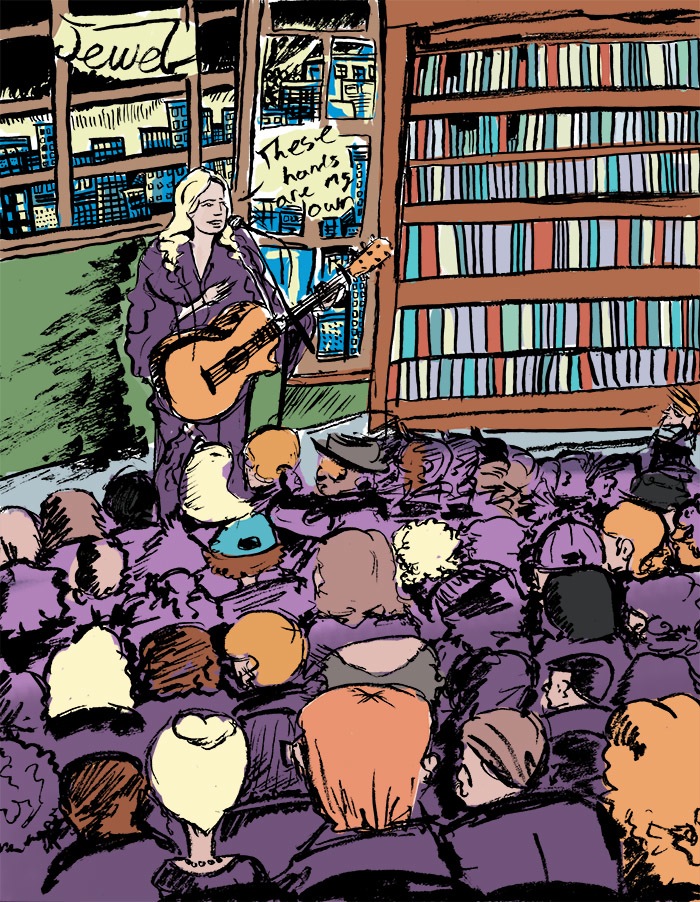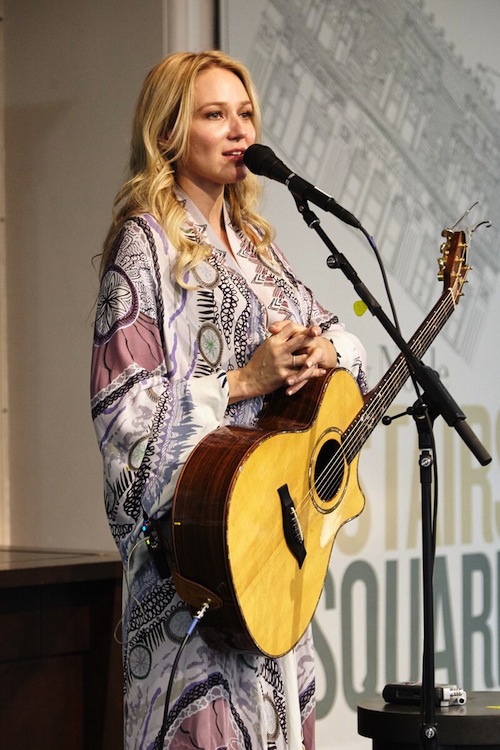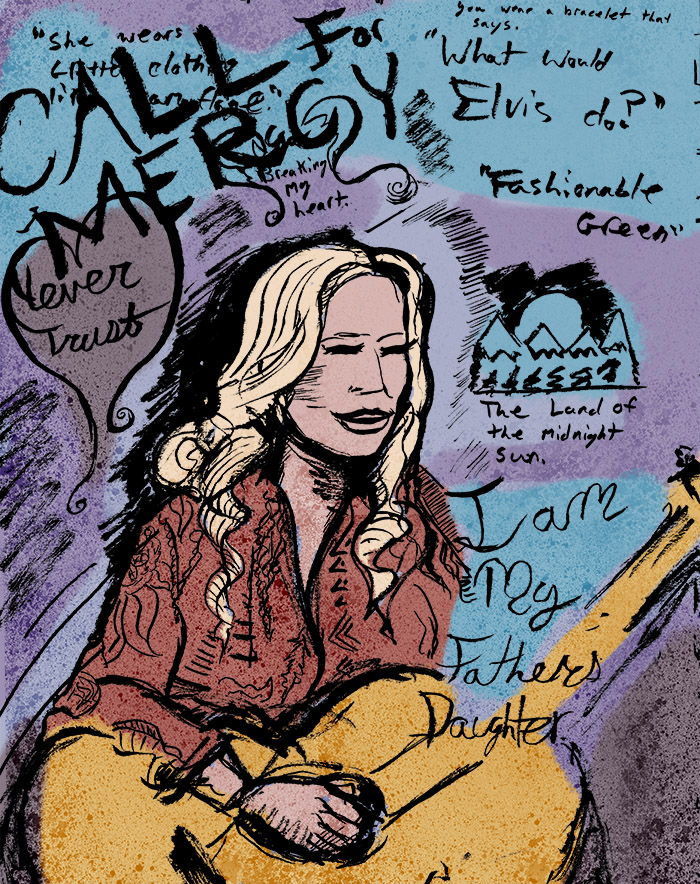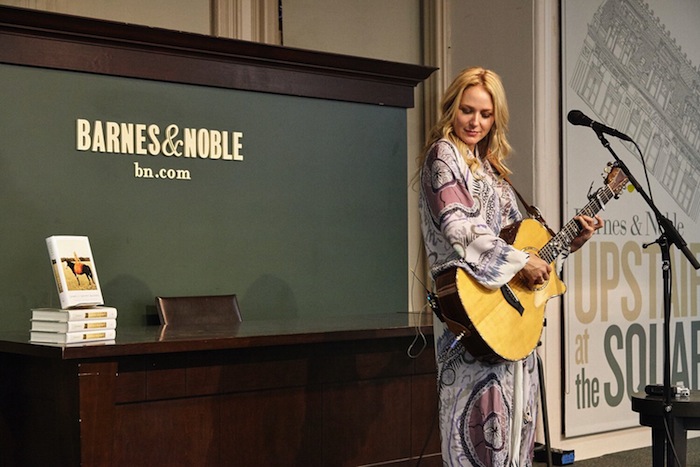11 Things We Learned About Jewel at her #BNAuthorEvent
Jewel has had an interesting life, full of twists and turns that may surprise you. Did you know that she was homeless and shoplifting? Did you know that her family helped carve the way in the Alaska Frontier? Did you know that her grandmother was an Opera singer? We learned so much about her when she came and spoke to a packed-house in Manhattan about her new book, Never Broken, and it made us want to know so much more. (Which is why we are all picking up the book.)
She worked as a salesperson (and was terrible at it.) “When I was eighteen, I got fired from my job in San Diego. I sat down and this guy was like, ‘what’s the matter?’ I told him and he offered me a job as a salesperson, answering phones. I talked a lot but didn’t sell a lot. He wanted to talk with me one day, I assumed about my job performance, but I realized quickly he was propositioning me. So I slept with him. I’m kidding! I didn’t! That’s a terrible thing to joke about. I turned him down and laughed the whole thing off. The next day I went in for my paycheck. He wouldn’t look at me or talk to me and he wouldn’t give me my paycheck.”
That’s how she became homeless. “I got kicked out of where I was living and thought I’d live out of my car for a few months. I was sick all the time—I kept getting sick kidneys. I almost died in the parking lot of a hospital because they wouldn’t see me since I didn’t have insurance. The car I was living in got stolen, which sucked. But I wasn’t in it!”
 She took to shoplifting. “It started with food, with carrots actually, which apparently are the gateway food of stealing. It escalated to a dress. I saw this really frilly, beautiful sundress. I coveted it in my heart and I went in there to figure out how to steal it. I was in there with my baggy jeans on shoving this dress into my pants freaking out, and I suddenly got a glimpse of myself in the mirror and realized and how ridiculous this was. First of all, the dress was totally not me. Beyond that, it was just ridiculous, trying to steal a $40 dress. I had left home when I was fifteen, I had always had jobs, I had always supported myself. And here I was, eighteen years old, reduced to this. It was like a lightning bolt struck me and I thought, ‘when did I lose faith? Wen did I lose faith in myself?’ That’s when I decided to quit stealing.”
She took to shoplifting. “It started with food, with carrots actually, which apparently are the gateway food of stealing. It escalated to a dress. I saw this really frilly, beautiful sundress. I coveted it in my heart and I went in there to figure out how to steal it. I was in there with my baggy jeans on shoving this dress into my pants freaking out, and I suddenly got a glimpse of myself in the mirror and realized and how ridiculous this was. First of all, the dress was totally not me. Beyond that, it was just ridiculous, trying to steal a $40 dress. I had left home when I was fifteen, I had always had jobs, I had always supported myself. And here I was, eighteen years old, reduced to this. It was like a lightning bolt struck me and I thought, ‘when did I lose faith? Wen did I lose faith in myself?’ That’s when I decided to quit stealing.”
She looked at her hands. “I had read that your reality is your perception of reality, so I tried to challenge myself and figure out what I was thinking and what was my perception of reality was. It was so hard for me to get control over my thoughts. So I started to watch what my hands were doing. Your hands are your servants of your thought. I started to reverse engineer it. I started to try to figure out what I was thinking by watching what my hands were doing, then I started to change my thoughts by changing what my hands were doing, whether I was stealing or writing or opening doors or just idly killing time, and slowly my life did turn around.”
She suffered from agoraphobia “which is hard, having an intense fear to leave your house when you don’t have a house. So i pretty much had fear all the time.”
She learned about fear (and how to beat it.) “I learned how to retrain my brain and control my agoraphobia by playing games with myself. What I learned about fear is that it robs you of right now, and the only way you can change anything is if y ou’re here right now. If your fear takes the past and projects it to the future, you’re continually robbed of right now and you don’t have a chance to make a change.
ou’re here right now. If your fear takes the past and projects it to the future, you’re continually robbed of right now and you don’t have a chance to make a change.
This fueled her music. “I started to write songs about what I was experiencing. I started doing a really odd thing, I started talking about my worst flaws. I’d been so ashamed and embroiled in so much fear and turmoil that communication felt really good, to get on stage, even if it was for two people. And then a really weird thing happened. People didn’t ostracize me for being weird—they actually accepted me. Safety isn’t avoiding the next pain or tragedy, safety is actually in being vulnerable and showing exactly who you are and being more giving and open.
Her song “My Hands” was played to honor 9/11. “In 2001 Ty and I were camping in the woods of California and we saw this flag at half-mast. We thought maybe a local cowboy at a ranch had been murdered. Then we drove down the road about ten miles and the next flag was at half mast at the next ranch. We thought a fireman had been killed. And then, on this tiny dirt road, we start seeing pieces of papers in the ditch that said “God Bless Our Country,” “God Save Us.” We couldn’t figure out what was happening. Finally we got radio reception and realized that America had been attacked just a couple of days earlier. We sat there in complete disbelief. The DJ on the radio dedicated “My Hands,”  a song I had written about shoplifting, a song that i had written at such a hard time in my life. He dedicated it to America during a dark time in America’s life. It was very humbling.”
a song I had written about shoplifting, a song that i had written at such a hard time in my life. He dedicated it to America during a dark time in America’s life. It was very humbling.”
Artistic talent runs in the family. “My Grandmother Ruth was an opera singer in Europe, but decided to give up her dreams of singing and electricity and go to build a home and have eight children on the Alaska frontier. My dad’s childhood pictures looked like they were taken in the 1800s. The whole family was very talented, they sang, and wrote, and painted. My grandmother got to live to see me be successful. She said it was worth it to give up her dreams for me. What an amazing sacrifice.

She’s had ups and downs with her dad. “My dad and I had a really difficult relationship. Under all the stress, he began to be abusive when I was about eight. To his credit, he let me tell a really difficult story in my book. I asked him if he was okay with it and he said, “Jewel, this is your life and you have every right to talk about it.” He knew my desire was to talk about the larger system. I think very few people have a real and honest dialogue about what abuse without showing anger is. Unless you’re willing to have an honest conversation, you’re never going to change. We have a great relationship now and I wrote a song about that and the sacrifices my grandmother made, “My Father’s Daughter.”
She embraces her pain. “My goal has never been to make my art propaganda to make my life seem more perfect than it is. At the same time I really don’t believe our pain has to define us except in the ways that we choose, and I believe we aren’t broken. Our souls are not teacups or chairs that can be damaged. I had this image of an archeological dig back to myself and I realized I’m not ruined. I just have to get rid of what never belonged to me. Our pain makes us exceptional people.”